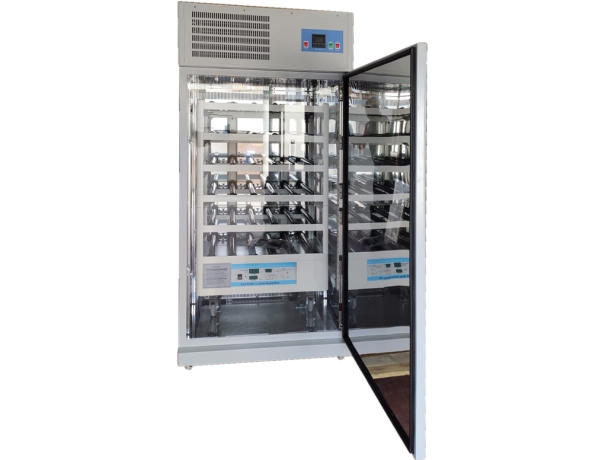A Laboratory Roller Culture Apparatus is a specialized device designed to support the growth and maintenance of cells in cylindrical culture vessels, commonly referred to as roller bottles. By continuously rotating the bottles, the apparatus ensures even distribution of nutrients, oxygen, and cells across the growth surface, creating optimal conditions for cell proliferation.
The apparatus is widely used for culturing adherent monolayer cells, such as fibroblasts and epithelial cells, as well as suspension cells, including hybridomas and lymphocytes. Its versatility and scalability make it a cornerstone of cell culture processes in academic research, pharmaceuticals, and biotechnology.
Key Features of the Roller Culture Apparatus
- Customizable Speed and Rotation Settings
The apparatus allows precise control over rotation speed, typically ranging from 0.1 to 5 revolutions per minute (RPM). This flexibility ensures that both monolayer and suspension cells receive the appropriate mechanical stimuli for optimal growth. - Uniform Mixing and Aeration
By rotating the culture bottles, the apparatus promotes consistent mixing of the culture medium, enhancing oxygenation and nutrient distribution. This is crucial for the survival and proliferation of cells, particularly in high-density cultures. - Temperature and Humidity Control
Many modern roller culture systems integrate with incubators or come with built-in temperature and humidity controls, ensuring a stable environment for cell growth. - Scalability
With options to accommodate multiple roller bottles simultaneously, the apparatus supports both small-scale experiments and large-scale biomanufacturing processes.
Advantages for Monolayer Cell Culture
Monolayer cultures, where cells grow attached to a surface, require consistent nutrient supply and removal of waste products. The roller culture apparatus addresses these needs through:
- Enhanced Surface Area Utilization: Roller bottles provide a larger surface area compared to static flasks, enabling higher cell yields in a compact space.
- Reduced Shear Stress: Gentle rotation minimizes shear forces, preserving the integrity of delicate monolayer cells.
- Batch Consistency: Uniform conditions across bottles ensure reproducibility in experimental and production settings.
Applications in Research and Industry
The roller culture apparatus has found applications across various fields, including:
- Vaccine Production: Roller bottles are commonly used to grow viral cultures for vaccines, such as influenza or rabies vaccines.
- Recombinant Protein Synthesis: Biopharmaceutical companies rely on this system for producing monoclonal antibodies and other therapeutic proteins.
- Stem Cell Research: The gentle rotation supports the expansion of stem cells for regenerative medicine.
- Toxicology Testing: Researchers use monolayer cultures grown in roller bottles for high-throughput drug screening and cytotoxicity studies.
